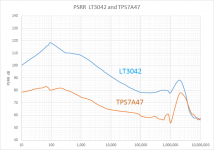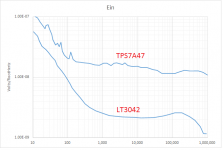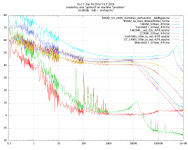Batteries aslo generate noise so they are not a ideal voltage source.
hi, anything better than batteries?
What should the whole discussion? It hardly matters how good the power supply is. It's just audio. Not a nano voltmeter. A well designed proved audio circuit is 100 times more important, like a power supply.
It hardly matters how good the power supply is.
Sorry but this is plain stupidity. You believe in something you think is a fact. It is very simple to debunk this. As may DIYers have experienced all you have to do is try something out, measure the results, listen and then make statements. And no, it is not enough to do this just once with one particular device.
* Subbu and I have designed a simple DAC of which I made more than 50 revisions. I ended up with 4 separate low noise regs. DAC chip, XO and receiver all have their own reg. When using mediocre regs the design did not perform as good. When using just 1 reg results were bad. When I added coils results got better. Most attention was needed for the PSU (as always). Even IC's with a very good PSRR will benefit from a better PSU.
It all starts with the PSU and building a very good PSU always pays off whereas a mediocre PSU will always have a detrimental effect. Conclusion: it is easier and less time consuming to do it right from the start if you want to squeeze the best out of a device.
Last edited:
It does not matter if your power supply has 2mV ripple and noise or 500uV. The performance data of the audio circuit does not change thereby. You can not hear what you can not measure.
You state that facts that can be measured can not be measured ? Ignoring facts is a serious condition which can lead to dogmas. Before you know it one starts applying the same logic on other things in life and this can lead to isolation.
I just told you I designed a DAC where I put a lot of time in that did benefit from a better PSU. It was the largest Group Buy on DIYaudio.com. Many builders can testify the quality of this device. In fact the largest contributor to the quality IS the design of the PSU.
In your logic one can throw together a bunch of parts as it does not make any difference. Even a PSU can have 500 µV or 2 mV ripple. It all does not matter. Has it ever occurred to you that a well designed device benefits from a well designed PSU ? That noise gets amplified ? That out of band HF noise can influence the circuits performance ? That you CAN measure AND hear difference ? Of course many thing are greatly exaggerated in audio but one can't deny facts.
I just told you I designed a DAC where I put a lot of time in that did benefit from a better PSU. It was the largest Group Buy on DIYaudio.com. Many builders can testify the quality of this device. In fact the largest contributor to the quality IS the design of the PSU.
In your logic one can throw together a bunch of parts as it does not make any difference. Even a PSU can have 500 µV or 2 mV ripple. It all does not matter. Has it ever occurred to you that a well designed device benefits from a well designed PSU ? That noise gets amplified ? That out of band HF noise can influence the circuits performance ? That you CAN measure AND hear difference ? Of course many thing are greatly exaggerated in audio but one can't deny facts.
Last edited:
It does not matter if your power supply has 2mV ripple and noise or 500uV. The performance data of the audio circuit does not change thereby. You can not hear what you can not measure.
no more misinformation pls
get the best possible power supply is already a common sense among dac designer/diyers, clock/dac/output stage are all sensitive to supply noise and is immediately audible
there are applications where some noise is no issue such as the simple MCU inside your washing machine
Batteries aslo generate noise so they are not a ideal voltage source.
Does an ideal voltage source exist? Don't mean to be start an argument, just curious. I guess the point of discussion should be -- in the current application, would using a battery as the power supply "better".
Regards,
Batteries aslo generate noise so they are not a ideal voltage source.
what kind a test have you made for such statement ?
.
It does not matter if your power supply has 2mV ripple and noise or 500uV. The performance data of the audio circuit does not change thereby. You can not hear what you can not measure.

Quite.
I think the only generous thing to say would be ..we need to help this member upgrade what he/she might be able to measure ..!
I think the only generous thing to say would be ..we need to help this member upgrade what he/she might be able to measure ..!
what kind a test have you made for such statement ?
Use Google and use the key words "noise in batteries" and you will find.
Batteries aslo generate noise so they are not a ideal voltage source.
Fat NiCds are about as good as it gets.
My measurements:
< http://www.hoffmann-hochfrequenz.de/downloads/NoiseMeasurementsOnChemicalBatteries.pdf >
The literature section contains a pointer to NIST results that can measure a few dB lower.
I'll add 3.7V 18650 Lithium soon. They are already on the table.
At low frequencies, the preamp is the limit.
Last edited:
Use Google and use the key words "noise in batteries" and you will find.
you kidding , I suppose 🙄
buy some nano tech lipo battery and make test yourself , and you will see 🙂
have a look at this document : https://www.mikrocontroller.net/attachment/100819/Measurement_of_Chemical_Battery_noise.pdf
knowing that lipo have lower noise ....
.
Last edited:
Yes, batteries are not ideal and they are certainly no green solution compared to good old mains power. A bold statement but it seems mains fed LT3042 wins hands down from batteries with regards to noise. That is good as batteries pose challenges and user friendliness is absent. They always seem to be depleted when you want to use a device. Most users lack discipline in correct charging leading to premature EOL of the battery in question. Anyone with a cell phone will acknowledge.
Why solve a non intrusive issue with a non working solution that ends up in landfill ? I can only imagine batteries to be a solution for mobile use.
Why solve a non intrusive issue with a non working solution that ends up in landfill ? I can only imagine batteries to be a solution for mobile use.
Last edited:
there are many people who speak about lipo battery , they have read stuf here or there , they think , this or that ....
but very few have test them in lab condition ,or/and in audio setup , so what else to say 🙄
as Democritus says :"Nothing exists except atoms and empty space , everything else is opinion” .....
.
but very few have test them in lab condition ,or/and in audio setup , so what else to say 🙄
as Democritus says :"Nothing exists except atoms and empty space , everything else is opinion” .....
.
A bold statement but it seems mains fed LT3042 wins hands down from batteries with regards to noise.
Boldness is no replacement for truth.
The fat NiCd in my article above are 10 dB better than the LT3042.
The pictures are comparable. Same preamplifier, same FFT analyzer,
same automated measurement software. In fact, they hit the bottom
of the dynamic range of my setup. The steep rise below 50 Hz is
a shortcoming of the preamp I used then. Input cap was too small.
0 dB is 1 nV/root Hz. 20 dB is 10 nV/root HZ
At NIST, they had a slightly worse preamp but could use cross correlation,
so all in all they are a few dB better.
The optimum load cap for the LT3042 is 4.7uF. Overdoing gets you
a noise peak. There is a trace with 22uF.
The pdf from microcontroller.net is the NIST article I mentioned.
Attachments
Last edited:
- Home
- Source & Line
- Digital Line Level
- Low noise regulator for DAC & clock



